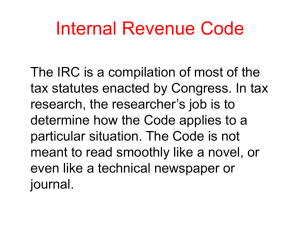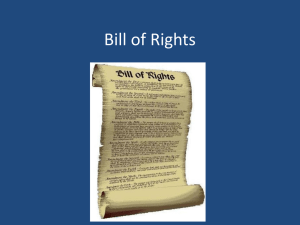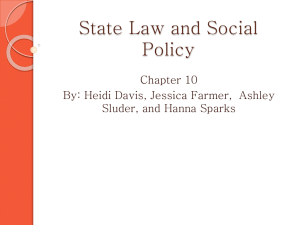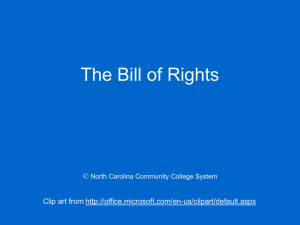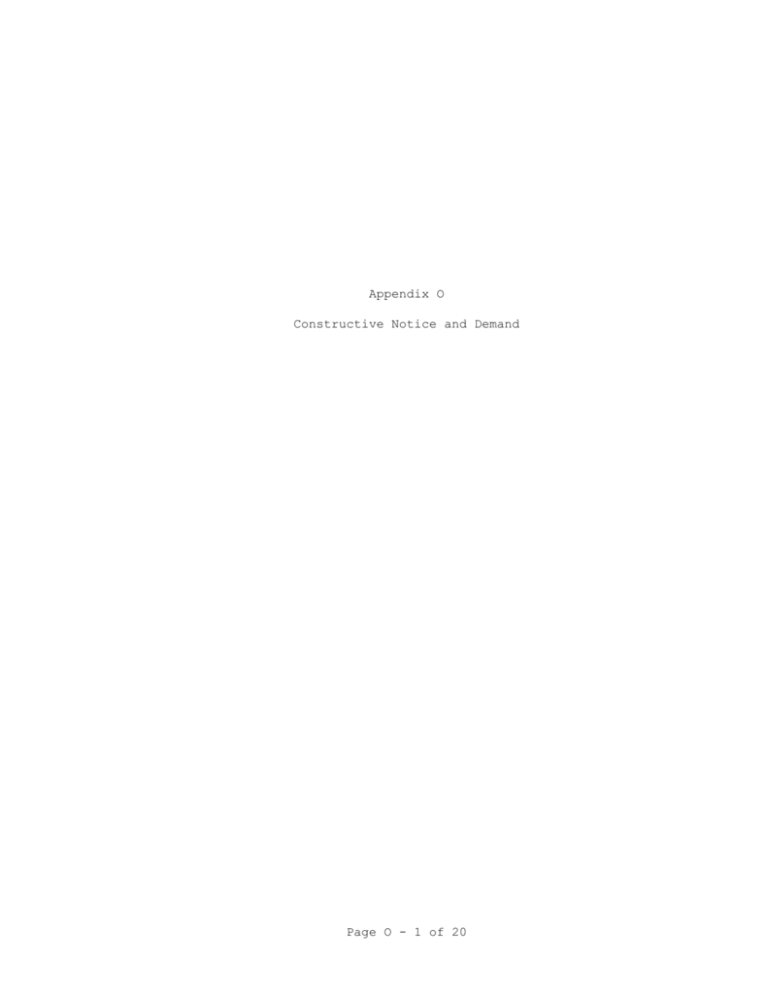
Appendix O
Constructive Notice and Demand
Page O - 1 of 20
The Federal Zone:
Reader's Notes:
Page O - 2 of 20
Appendix O
Registered U.S. Mail
Return Receipt Requested
Postal Serial #
c/o Street/P.O. Box
City, State
zip code exempt
(DMM 122.32)
Date
District Director
Internal Revenue Service
Agents of Foreign Principals
City [ZIP code exempt]
STATE
Re:
Constructive Notice, Demand, and Statement
Regarding IRS Request for Form 1040 Tax Return
Dear Mr. Director:
This correspondence addresses your agency's request that I file a Form
1040 tax return and pay a tax for which I am not made liable. Enclosed with
your agency's request was IRS Notice 557, entitled "Who Must File a Federal
Income Tax Return".
Because you are in the initial stages of making a
serious error with me regarding your lawful jurisdiction and authority in
this "1040" matter, I hereby issue this constructive notice, demand and
statement.
This constructive notice is to advise you of my lawful status as a
Sovereign natural born free State Citizen under the U.S. Constitution (see
2:1:5), that is, a "non-taxpayer" under the law, and to demand that you
comply with all due process requirements of the law and permanently curtail
any further information collection requests and proceedings against my person
and my property.
Be advised that I am not a "citizen of the United States" and I am not
a "resident of the United States". I am and have always been a "nonresident
alien" from birth (my legal status), as that term is now defined in the
Internal Revenue Code (IRC) and its regulations.
Among its other purposes,
this letter now explicitly rebuts, retroactively to my date of birth, any
erroneous presumptions and terminates any erroneous elections of "U.S.
residence" which were established as a consequence of demonstrable mistakes,
by me and others, which resulted in part from the vagueness that is evident
in the IRC and its regulations, and in part from the actual and constructive
frauds which have been perpetrated upon all Americans by the Congress and
other federal officials at least since the year 1913.
To demonstrate the vagueness to which I refer, after an honest and a
diligent search which now stretches over several years, I am still unable to
find in the IRC any statute which defines the "intent" of that Code (see IRC
7701(a) et seq.), nor have I been able to find any statutory definition of
the term "income", even though "gross income", "earned income" and "ordinary
income" are defined.
(For proof, see U.S. v. Ballard, 535 F.2d 400, 404,
(1976)).
My family obligations now demand that I stop searching for
definitions which evidently do not exist, and shift to you, Mr. Director, the
burden of finding and exhibiting these definitions. I stand on my rights to
substantive due process, as guaranteed by the Bill of Rights, which nullify
Page O - 3 of 20
The Federal Zone:
any and all actions you and others in your agency may take under the presumed
"authority" of vague and arbitrary statutes and their associated regulations.
To demonstrate the fraud to which I refer, there are now literally
thousands of certified documents which constitute material evidence proving,
beyond any reasonable doubt, that the so-called 16th Amendment was never
ratified.
Your agency can no longer rely on it as law, as was done by
Commissioner Donald C. Alexander in The Federal Register of March 29, 1974,
Volume 39, No. 62, page 11572.
At that time, Mr. Alexander published his
official statement about the IRS as follows:
Since 1862, the Internal Revenue Service has undergone a period of
steady growth as the means for financing Government operations shifted
from the levying of import duties to internal taxation. Its expansion
received considerable impetus in 1913 with the ratification of the
Sixteenth Amendment to the Constitution under which Congress received
constitutional authority to levy taxes on the income of individuals and
corporations.
[emphasis added]
Contrast this statement with the ruling of an Illinois State Court: "It is
as much a nullity as if it had been the act or declaration of an unauthorized
assemblage of individuals," (Ryan v. Lynch, 68 Ill. 160).
Several District
Courts of Appeal have been presented with the question of whether or not the
so-called 16th Amendment was properly ratified. See:
Miller v. United States,
U.S. v. Sitka,
Stubbs v. Commissioner,
United States v. Stahl,
United States v. Ferguson,
Sisk v. Commissioner,
868
845
797
792
793
791
F.2d 236 (1989, 7th Circuit)
F.2d
43 (1988, 2nd Circuit)
F.2d 936 (1986, 11th Circuit)
F.2d 1438 (1986, 9th Circuit)
F.2d 828 (1986, 7th Circuit)
F.2d
58 (1986, 6th Circuit)
It has been well documented that Philander C. Knox knew that the
so-called 16th Amendment had not been properly ratified by the 48 States in
1913, yet he certified its ratification anyway. This is fraud. The courts,
when presented with this overwhelming problem, have decided that the fraud
perpetrated upon the people was in the nature of a "political" question and,
therefore, not proper for judicial review.
The sole exception to this
pattern has been the case of People v. Boxer, California Supreme Court No.
S-030016, December 1992, a petition for a Writ of Mandamus to which Senator
Boxer failed to respond in any way;
the meaning of her silence has been
explained in U.S. v. Tweel infra.
Since the so-called 16th Amendment has now been declared a "political"
question, my "political" actions are deserving of the protection guaranteed
by the First Amendment to the Constitution for the United States of America.
Boycotting the Internal Revenue Service and the income tax, under the
protection of the First Amendment, is definitely a part of our democratic
political process, until such time as Congress (or the federal Courts) decide
to resolve this political question once and for all.
Moreover, the federal government has committed further fraud, duress
Page O - 4 of 20
Appendix O
and coercion, exercised undue influence, and evidenced unlawful menace
against the American people by representing the so-called 14th Amendment as a
lawfully ratified amendment in the U.S. Constitution, when contrary proof,
published court authorities and other competent legal scholars have now
established that it was NOT lawfully ratified.
(For conclusive proof, see
State v. Phillips, 540 P.2d 936 (1975);
Dyett v. Turner, 439 P.2d 266
(1968);
28 Tulane Law Review 22;
11 South Carolina Law
Quarterly 484;
House Congressional Record June 13, 1967, page 15641 et seq.)
This constructive notice to you is based upon legal advice which I have
received from a number of attorneys, CPA's, income tax professionals, and
upon
in-depth
research
into
the
Internal
Revenue
Code,
applicable
regulations, court cases, the laws concerning "Delegation of Authority"
(i.e., the Federal Register Act and the Administrative Procedure Act), the
Privacy Act, and the U.S. Constitution (the supreme law of the land).
One particularly revealing document (which I will emphasize herein)
that proves my legal position is the Privacy Act Notice (Publication #609)
which I obtained from the IRS, and which is also published in the IRS
Instructions for Form 1040.
You are hereby advised that, as a Sovereign natural born free State
Citizen under the U.S. Constitution (see 2:1:5), I explicitly reserve all my
rights and waive none.
I demand that you, in your capacities as a public
servant and as an individual, comply with the law and afford me substantive
and procedural due process at all times. In order for you to afford me all
due process in this matter, I now demand the following:
DELEGATION OF AUTHORITY ORDERS
I hereby demand that you send me copies of the Delegations of Authority
from the Secretary of the Treasury, all the way down to your position as
District Director, which create and set forth your full and complete
authority to function and act in your present capacity as an employee of the
Internal Revenue Service.
I also demand to receive copies of the Delegations of Authority that
have been handed down to any other case agent(s) who have assisted you in
issuing the above mentioned documents. I also demand the full names of said
agents.
Essentially, I demand to see the "chain" of authority delegations above
yours, to determine if they are properly set forth and to determine if they
have all been properly published in the Federal Register as required by the
law (the Act of July 26, 1935, 49 Stat. 500) which created the Federal
Register, and by the Administrative Procedure Act, Section 3.
Section 3 of the Administrative Procedure Act clearly commands that the
following types of agency rules are to be published in the Federal Register:
Every agency shall
Federal Register:
separately
state
and
Page O - 5 of 20
currently
publish
in
the
The Federal Zone:
(1)
descriptions of its central and field organization including
delegations by the agency of final authority and the established
places at which, and the methods whereby the public may secure
information or make submittals or requests;
(2)
statements of the general course and method by which its
functions are channeled and determined, including the nature and
requirements of all formal or informal procedures available as
well as forms and instructions as to the scope and content of all
papers, reports, or examinations; and
(3)
substantive rules adopted as authorized by law and statements of
general policy or interpretations formulated and adopted by the
agency for guidance of the public, but not rules addressed to and
served upon named persons in accordance with law ....
Both Sections 3 and 9 of the Act protect the public from an agency's failure
to publish this required information:
No person shall in any manner be required to resort to organization or
procedure not so published. ...
No sanction shall be imposed or substantive rule or order be issued
except within jurisdiction delegated to the agency and as authorized by
law.
Also, Section 7 of the Federal Register Act states:
No document required under section 5(a) to be published in the Federal
Register shall be valid as against any person who has not had actual
knowledge thereof.
Mr. District Director, the point here is due process of law. I demand
full compliance. Do not send me any copies of delegation orders unless you
can satisfy the entire request. A partial response by you will evidence your
failure to satisfy this request and will fail to prove your lawful authority
by any means.
It has come to my attention that the Office of the Federal Register has
issued a statement indicating that Treasury Department Orders 150-10 and 15037 (regarding taxation) were not published in the Federal Register.
Evidently, there are no published orders from the Secretary of the Treasury
giving the Commissioner of Internal Revenue the requisite authority to
enforce the Internal Revenue Code within the 50 States of the Union.
Furthermore, under Title 3, Section 103, the President of the United States
of America, by means of Presidential Executive Order, has not delegated
authority to enforce the Internal Revenue Code within the 50 States of the
Union.
Very simply, Mr. District Director, you are required to present proof
that the above mentioned orders have been published in the Federal Register
prior to the date of your initial request for information, and prior to the
issuance of any unilateral determinations, by you and/or your case agent(s),
of my status as a "taxpayer" or a "nontaxpayer".
Page O - 6 of 20
Appendix O
As proof that my request is valid and lawfully on point, I refer you to
the following statutes and authorities that make it necessary for the
Secretary of the Treasury to delegate authority to the Commissioner of
Internal Revenue. First, by authority of the Internal Revenue Code, Section
7602, the Secretary is authorized to issue a summons. This section must be
read in conjunction with Section 7701: "Definitions".
Note, in particular,
definitions (11) and (12) in order to identify individuals properly:
Section 7602.
(a)
Examination of books and witnesses.
Authority to Summon, Etc.
-For the purpose of ascertaining
the correctness of any return, making a return where none has
been made, determining the liability of any person for any
internal revenue tax or the liability at law or in equity of any
transferee or fiduciary of any person in respect of any internal
revenue tax, or collecting any such liability, the Secretary is
authorized ....
Section 7701(a)(11).
(A)
Secretary of the Treasury and Secretary.
Secretary of the Treasury. The term "Secretary of the Treasury"
means the Secretary of the Treasury, personally, and shall not
include any delegate of his.
Section 7701(12).
Delegate
(A)
The term "or his delegate":
(B)
In General.
(i)
when used with reference to the Secretary of the Treasury,
means any officer, employee, or agency of the Treasury
Department duly authorized by the Secretary of the Treasury
directly, or indirectly by one or more redelegations of
authority, to perform the function mentioned or described
in the context; and
(ii)
when used with reference to any other official
United States, shall be similarly construed.
of
the
Performance of Certain Functions in Guam or American Samoa. The
term "delegate," in relation to the performance of functions in
Guam or American Samoa with respect to taxes imposed by Chapters
1, 2, and 21, also includes any officer or employee of any other
department or agency of the United States, or of any possession
thereof,
duly
authorized
by
the
Secretary
(directly,
or
indirectly by one or more redelegations of authority) to perform
such functions.
Further, Treasury Department Order No. 150-10 can be found in Commerce
Clearinghouse Paragraph 6585 (unofficial publication).
Section 5 reads as
follows:
Page O - 7 of 20
The Federal Zone:
U.S. Territories and Insular Possessions.
The Commissioner shall, to
the extent of authority otherwise vested in him, provide for the
administration of the United States internal revenue laws in the U.S.
Territories and insular possessions and other authorized areas of the
world.
Thus, the evidence available to me indicates that the only authority
delegated to the Internal Revenue Service is to enforce tax treaties with
foreign territories, U.S. territories and possessions, and Puerto Rico.
To
be consistent with the law, Treasury Department Orders, particularly TDO's
150-10 and 150-37, were deemed necessary to be published in the Federal
Register. Thus, given the absence of published authority delegations within
the 50 States of the Union, the obvious conclusion is that the various
Treasury Department orders found in Internal Revenue Manual 1229 have
absolutely no legal bearing, force or effect on Sovereign Citizens of these
50 States, such as myself.
Again, the Secretary of the Treasury delegates his authority to the
different department heads by Treasury Department Orders, which require
publication in the Federal Register pursuant to 44 U.S.C. 1501 et seq. Only
when the Secretary of the Treasury properly delegates authority to the
Commissioner of Internal Revenue, and said orders are duly published in the
Federal Register, then and only then does the Commissioner have authority to
re-delegate
authority
to
his
subordinates
by
issuing
Commissioner's
Delegation Orders, which become a part of Internal Revenue Manual 1229.
All orders affecting the rights and obligations of "citizens of the
United States" and "residents of the United States" must be published in
accordance with the proper authorities. Pursuant to 44 U.S.C. 1501 et seq.,
no one can be adversely affected or bound by an unpublished order, and anyone
may lawfully and safely ignore such an order with impunity.
Of course, no
one anywhere in the world can be affected if the proper and relevant
delegation orders are not duly published.
Without lawful delegation of authority to issue, among other things,
your "Request for Tax Return", to determine correctness of any return, to
make a return where none has been made, to make and issue determinations of
deficiencies for any internal revenue tax, and/or to file tax liens and
institute levies, Mr. District Director, you cannot proceed further against
me in this matter, particularly with your intent to collect information and,
ultimately, to collect taxes.
Mr. District Director, if you are unable to comply with the demands in
this letter on or before [date exactly 30 days hence], I will correctly
conclude under law that you have absolutely no delegated authority, that you
are acting under a covert, secret jurisdiction and, as such, that you are
operating unlawfully under color of law and cannot proceed further in this
matter, period.
Moreover, after this deadline, your failure to comply will
mean that you are forever barred by the doctrine of estoppel by acquiescence
from proceeding any further against me in this regard.
JURISDICTION IS REQUIRED TO BE PROVEN
Page O - 8 of 20
Appendix O
Your delegated authority must include, but not be limited to
Constitutional,
Statutory,
Contract
and/or
Merchant
Law(s),
including
treaties if any.
If you claim the jurisdiction of statutory law as your
authority, I demand that you disclose to me, in writing, how and in what
precise manner I became the subject and/or the object of said statute.
If you claim the jurisdiction of contract and/or merchant law as your
authority, I demand that you disclose to me, in writing, what contract or
commercial agreement granted this jurisdiction to you, including but not
limited to the title, date, witnesses thereto, and all parties thereto,
whereby I have knowingly, intentionally, and voluntarily entered into a
contract or commercial agreement which provides the legal basis for any such
alleged jurisdiction. In equity, you can be compelled by a court of law to
disclose fully, under oath, what contract or commercial agreement granted
this jurisdiction to you.
Mr. District Director, the issue of whether I, as a Sovereign natural
born free State Citizen under the Constitution (see 2:1:5), am liable by
statute to file a 1040 Form and to pay a tax under some alleged "blanket tax
law" is secondary to the issue of jurisdiction, because you must first prove
that you have lawful jurisdiction over me.
I am not aware of any facts on
record upon which you could have made a valid determination that I am a
"taxpayer/subject" pursuant to IRC Section 7701(a)(14), or to any other laws
cited above, or that I have granted you jurisdiction.
I submit that there
are no conclusive facts nor any conclusive presumptions on the administrative
record which have conferred jurisdiction to you upon myself or the subject
matter.
Therefore, and pursuant to IRC Section 6110, you are hereby required to
furnish me copies of the all documents upon which you have based your
presumptive determination that I am a "taxpayer/subject" who is in a
particular "taxable class" that lawfully authorizes you to issue your
"Request(s) for a 1040 Tax Return" to me and to institute collection efforts
against me.
There are numerous cases that speak to the status of a "nontaxpayer" as
opposed to the status of a "taxpayer". The following are just a few relevant
citations (see also Exhibit A for other relevant cases):
The term "taxpayer" in this opinion is used in the strict or narrow
sense contemplated by the Internal Revenue Code and means a person who
pays, overpays, or is subject to pay his own personal income tax. (See
Section 7701(a)(14) of the Internal Revenue Code of 1954.)
A
"nontaxpayer" is a person who does not possess the foregoing requisites
of a taxpayer.
[Economy Plumbing and Heating Co. v. U.S.]
[470 F.2d 585, note 3 at 590]
The revenue laws are a code or system in regulation of tax assessment
and collection. They relate to taxpayers and not to nontaxpayers.
[Economy Plumbing and Heating Co. v. U.S.]
[470 F.2d 585, at 589]
Page O - 9 of 20
The Federal Zone:
Persons who are not taxpayers are not within the system and can obtain
no benefit by following the procedures prescribed for taxpayers, such
as the filing of claims or refunds.
[Economy Plumbing and Heating Co. v. U.S.]
[470 F.2d 585, at 589]
The income tax is, therefore, not a tax on income as such.
It is an
excise tax with respect to certain activities and privileges which is
measured by reference to the income which they produce. The income is
not the subject of the tax: it is the basis for determining the amount
of the tax.
[House Congressional Record, March 27, 1943, at 2580]
It is a principle of law that, once challenged, the person asserting
jurisdiction must prove that jurisdiction exists as a matter of law.
For
judicial support of this principle, see in particular the following cases:
Griffin v. Matthews, 310 F.Supp. 341; 423 F.2d 272
McNutt v.. G.M.,
56 S.Ct. 780; 80 L.Ed 1135
Basso v.. U.P.L.,
495 F.2d 906
Thomson v. Gaskiel,
62 S.Ct. 673; 873 L.Ed 111
To deny me knowledge of jurisdiction and equal protection is to deny me
due process of law. Such is a violation by you of 42 U.S.C. 1983, and/or 18
U.S.C. 241 and 242, under which section I may sue you, should you willfully
deny me any right to due process and unlawfully move forward to collect
information, to assess, to collect monies, and/or to institute a lien or levy
action upon any of my property.
Mr. District Director, I do hope that you
understand the extreme liability and punishment that you face under the law
in the event of such violations.
NOTICE OF PERSONAL LIABILITY
As you are aware, Mr. District Director, if you, as an individual or as
a government employee/public servant, act outside your lawful capacity, with
no delegated authority, you can be held personally liable for each and every
violation that you commit.
However, at this point, you need simply comply
with the law. The burden is now rightfully and lawfully upon you to produce.
However, be further advised that my possible future remedies will
include the filing of a complaint against you and your superior(s) with a
U.S. Magistrate and the Federal Bureau of Investigation, and/or a formal
complaint with a U.S. Magistrate under Rule 3 of the Federal Rules of
Criminal Procedure demanding that a Summons be issued upon you to show cause
why you should not be formally charged with a violation of IRC Sections
7214(a)(1), (3), (6), and (7), for starters.
There could be charges filed against you for unauthorized and unlawful
disclosure under the Internal Revenue Code (IRC 6103) as well for your
failure to provide due process.
See, for example, Husby v. United States,
Page O - 10 of 20
Appendix O
672 F. Supp. 442, and Rorex v. Traynor, 771 F.2d 383.
states as follows:
IRC Section 7431(a)(1)
Disclosure by Employee of the United States.
If any officer or
employee of the United States knowingly, or by reason of negligence,
discloses any return or return information with respect to a taxpayer
in violation of any provision of section 6103, such taxpayer may bring
a civil action for damages against the United States in a district
court of the United States.
IRC Section 7431(c) provides for damages:
Damages. In any action brought under subsection (a), upon a finding of
liability on the part of the defendant, the defendant shall be liable
to the plaintiff in an amount equal to the sum of --(1)
(2)
the greater of -(A)
$1,000.00 for each act of unauthorized disclosure of a
return or return information with respect to which such
defendant is found liable, or
(B)
the sum of -(i)
the actual damages sustained by the plaintiff as a
result of such unauthorized disclosure, plus
(ii)
in the case of a willful disclosure or a disclosure
which is the result of gross negligence, punitive
damages, plus
the costs of the action.
A lawsuit for unlawful disclosure against you personally can be extremely
damaging and costly to you and your agency, because the $1,000 fine can be
multiplied a thousand-fold under certain conditions.
Other charges can include fraud, theft and criminal conspiracy to
deprive a Sovereign State Citizen of rights guaranteed to him by the U.S.
Constitution. Keep in mind that you personally enjoy absolutely no personal
immunity for acts committed outside your capacity as a public servant.
Furthermore, the Anti-Injunction Act will not protect you as long as there is
no valid information request, no valid notice, or no valid assessment with
respect to me, in addition to your lack of delegated authority.
Please note well the ruling in the following court case, particularly
as it affects agents who are unaware of the limitations upon their authority:
Whatever the form in which the Government functions, anyone entering
into an arrangement with the Government takes the risk of having
accurately ascertained that he who purports to act for the Government
stays within the bounds of his authority ... and this is so even though
as here, the agent himself may have been unaware of the limitations
upon his authority.
Page O - 11 of 20
The Federal Zone:
[Federal Crop Ins. Corp. v. Merrill, 332 U.S. 380]
LEGAL ADVICE RELIED UPON
During the past years, I have conducted diligent research and have
received and relied upon legal advice from independent tax professionals who
all advised me in writing that the law does not make me liable to file income
tax returns, no matter how much money I make.
Some of my counsel also
advised me of your agency's violations with regard to Delegations of
Authority, and have pointed out and proven many other serious problems and
violations. Thus, in a prudent sense, I have every reason to rely fully on
the legal advice I have received from tax professionals.
Also, Article 1, Section 10 of the U. S. Constitution secures my right
to contract.
Obviously, I enjoy the unalienable right to free association
through contract.
My relationship with all those with whom I choose to
associate is by private contract which cannot be impaired by you or anyone
else.
"Unalienable" rights are rights that cannot be surrendered or
transferred without my consent.
(See Exhibit A infra for relevant court
cases.)
IRS PRIVACY ACT NOTICE SUPPORTS
MY NON-FILER STATUS
Furthermore, the IRS Privacy Act Notice #609 which your agency sent to
me supports my legal position that I am not liable for sending you
information on a Form 1040. I am advised by professionals that your Notice
is deceptively written to trick all individuals into believing that they are
"liable", and therefore it is a shameful and vicious fraud.
Careful legal
analysis has brought forth the real explanation and proof. Your Notice first
refers to IRC Section 6001, which states in part:
Whenever in the judgement of the Secretary it is necessary, he may
require any person, by notice served upon such person or by
regulations, to make such returns, render such statements, or keep such
records, as the Secretary deems sufficient to show whether or not such
person is liable for tax under this title.
[emphasis added]
Your Notice 609 continues to Section 6011, which states in part:
When required by regulations prescribed by the Secretary any person
made liable for any tax imposed by this title, or with respect to the
collection thereof, shall make a return or statement according to the
forms and regulations prescribed by the Secretary.
[emphasis added]
I am advised that to be "liable" for a tax means that one is
responsible to provide information relative to such taxes on the appropriate
Page O - 12 of 20
Appendix O
"information collection request" form.
Neither of the above Code sections
states that all individuals are liable to make a return, and no specific
forms are mentioned either. This defect is in sharp contrast to other types
of taxes enumerated in the Code, all of which clearly have a Code section
specifically describing who is liable to fill out the return, to submit it
and to pay any tax that is owed. In this latter regard, the law is crystal
clear to me; but with regard to "income" taxes, the law and its regulations
are anything but crystal clear.
I must first be an individual who is subject to, and made liable for, a
particular type of tax under the IRC, e.g., income tax. Since I am neither
subject to, nor liable for, any particular type of tax under the IRC, there
is absolutely no requirement to comply with your request for information, for
the filing of a Form 1040, or even for payment of any income tax.
Finally, my tax professionals all advise me that Section 6012 of your
Privacy Act Notice does not apply to me;
it only applies to those who are
made liable or subject to, either by statute or by having volunteered to be
liable for, the filing of your tax form.
However, notwithstanding the facts that Sections 6001 and 6011 of your
Privacy Act Notice do not make me liable for the tax, and fail to even crossreference a Code section in Subtitle A that would make me liable to file, as
a purely voluntary act on my part and to prove my good faith in resolving
this matter, here is my "statement":
In good faith, I have determined from written, reliable, legal advice
from tax professionals and further research into the law, that I am not
liable or subject to or for any tax under the IRC, and nothing I
receive is subject to tax under Subtitle A. I am not a "taxpayer" as
defined in Section 7701(a)(14), and as defined in Section 1313(b). Nor
am I that "person" as defined in Section 7343. And, I am not engaged
in any revenue taxable activity under the IRC, and I have no valid
contracts with your agency, direct or quasi. Thus, you have no lawful
jurisdiction to proceed further in this matter.
I have unalienable, God-given rights which I will not waive at any
time, and you are prohibited from violating my absolute right to due
process by instituting unlawful assessments, levies or seizures.
Essentially, your "income tax" and the Internal Revenue Code simply do
not apply to me, as an individual with free Sovereign natural born
Citizen status, inhabiting a Sovereign State of the Union.
In addition, your Privacy Act Notice constitutes a "Miranda Warning" to
me, because it states that "the information may be given to the Department of
Justice and to other federal agencies, as provided by law."
The 5th
Amendment protects me from revealing any and all information which you may
give to the Justice Department and other federal agencies, because this
amendment provides that NO PERSON SHALL BE COMPELLED TO BE A WITNESS AGAINST
HIMSELF. Please be advised that this right of mine is not negotiable under
any circumstances.
I have never waived any of my rights knowingly,
intentionally, or voluntarily.
I have never committed any knowingly
intelligent acts which, to my knowledge, could or would be construed as
waiving any of my rights.
Page O - 13 of 20
The Federal Zone:
Again, Mr. District Director, you have asked me for information,
including a 1040 Income Tax Return, and it appears impossible for me to give
you any information whatsoever without waiving one or more of my God-given
unalienable
rights,
which
rights
are
explicitly
guaranteed
by
the
Constitution for the United States of America.
In further support of my
right to claim the protection of the 5th Amendment, I refer specifically to
your own IRS Special Agent's Handbook, Section 342.11(2), which states as
follows:
The right to refuse to answer incriminating questions applies not only
to court trials, but to all kinds of criminal or civil proceedings,
including administrative investigations.
[George Smith v. U.S., 337 U.S. 137 (1949)]
[U.S. v. Harold Gross, 276 F.2d 816]
[Counselman v. Hitchcock, 142 U.S. 547, 563 (1892)]
[McCarthy v. Arndstein, 266 U.S. 34, 40 (1924)]
Further, the 4th Amendment right is likewise relevant here, because it
follows that a violation of the 5th Amendment, and any forcible extraction of
information or property against my will, constitute an illegal search and
seizure.
There is no "probable cause", as required by the 4th Amendment,
because jurisdiction has not been proven.
The famous case of Miranda v. Arizona, 384 U.S. 436 (1966), sums up the
relevant strength of my rights as a Sovereign State Citizen, as follows:
Where rights secured by the Constitution are involved, there can be no
rule making or legislation which would abrogate them.
You also compound your fraud upon the inhabitants of the 50 States of
the Union by implying that all individuals (without exception) are required
to file a tax return, when it is well settled that federal income taxes are
completely and totally voluntary for nonresident aliens who live and work
outside areas of exclusive federal legislative jurisdiction, unless their
income derives from a source that is inside a federal area (see the
authorities at 1:8:17 and 4:3:2 in the United States Constitution, Treasury
Decision 2313 and the case cited therein).
Your ADP and IDRS document 6209 classifies the W-2 and W-4 in a number
five (#5) tax class.
This indicates that the form is only for a gift tax.
This also confirms that the tax is a voluntary tax;
when individuals fill
out these forms, they are voluntarily giving a gift. There is also a problem
with your W-4 in that there must first be a tax imposed upon an individual
before that individual can incur a tax liability.
For most individuals, no
section of the Code can be found which imposes an income tax on them and
therefore makes them liable, hence they "incurred no liability for income tax
imposed under subtitle A of the Code ...."
Another problem
claim exemptions, but
claim exemptions, you
problem with the W-4
with
only
are
form
the W-4 form is that it does not allow you to
allowances.
Therefore, whenever you attempt to
automatically falsifying the form.
Yet another
is its title.
It does not purport to be an
Page O - 14 of 20
Appendix O
Employee's Withholding Exemption Certificate.
Employee's Withholding Allowance Certificate.
It
purports
to
be
an
The end result of what the Internal Revenue Service has accomplished is
the promulgation of a plethora of regulations to govern a form which simply
does
not
exist
(see
26
CFR
Secs.
31.3402(f)(1)-1(e)(2),
3402(n),
31.3402(f)(5)-1(b)(1).)
In summary, for a Sovereign State Citizen such as myself, providing
information and proceeding to pay taxes pursuant to a 1040 form is entirely
voluntary. The voluntary nature of the tax system is clearly proven by the
following statement by the U.S. Supreme Court:
Our system of taxation is based on voluntary assessment and payment,
not upon distraint.
[U.S. v. Flora, 362 U.S. 176]
[emphasis added]
CONCLUSIONS
The above jurisdictional challenge and constructive notice are made in
good faith. My sincere intent is to uphold the Supreme Law of the Land, the
U.S. Constitution, and all relevant laws that are consistent with the
Constitution, and to simply resolve this matter quickly by getting to the
truth of the law and the facts as outlined above for the record.
And you,
Mr. District Director, in your capacity as a public servant and as an
individual as well, also have a clear obligation to uphold the United States
Constitution and the relevant laws as stated above. I demand that you follow
all the rules and afford me all due process.
In the case of Robinson v.
U.S., 920 F.2d 1157, the Appellate Court stated that this is an IRS game that
is being played and, therefore, the IRS must play according to the rules:
The procedural provisions of the Code appear to be the creation of a
scholastic, but whimsical mind.
In general, however, the Courts take
them literally;
the game must be played according to the rules.
In
the factual situation here, the IRS broke the rules.
[Johnson, An Inquiry into the Assessment Process]
[35 Tax L. Rev. 285, 286 (1980)]
The burden of proof is now entirely upon you, Mr. District Director.
As time is of the essence, do not ignore this notice and demand. In regard
to your decision to reply or not, please bear in mind the following quote
from the U.S. Court of Appeals:
Silence can only be equated with fraud where there is a legal or moral
duty to speak or where an inquiry left unanswered would be
intentionally misleading. ... We cannot condone this shocking conduct
by the IRS.
Our revenue system is based upon the good faith of the
taxpayers and the taxpayers should be able to expect the same from
government in its enforcement and collection activities.... This sort
of deception will not be tolerated and if this is the "routine" it
Page O - 15 of 20
The Federal Zone:
should be corrected immediately.
[U. S. v. Tweel, 550 F.2d 297, 299 (1977), emphasis added]
[quoting U.S. v. Prudden, 424 F.2d 1021, 1032 (1970)]
Silence is a species of conduct, and constitutes an implied
representation of the existence of the state of facts in question, and
the estoppel is accordingly a species of estoppel by misrepresentation.
[cite omitted]
When silence is of such a character and under such
circumstances that it would become a fraud upon the other party to
permit the party who has kept silent to deny what his silence has
induced the other to believe and act upon, it will operate as an
estoppel.
[Carmine v. Bowen, 64 A. 932 (1906), emphasis added]
Obviously, Mr. District Director, your response must be in writing. To
be sure that I receive it, I require you to send it via either Certified or
Registered Mail, return receipt requested.
There is abundant case law that
sets forth the following axiom of law:
When jurisdiction is challenged in writing, it must be answered in
writing.
[emphasis added]
I hereby demand that you comply with this constructive notice and
demand, and that you take corrective actions by simply curtailing any and all
"information collection actions" that you currently have in process relative
to me.
Your failure to take this action will prove bad faith, that is, a
willful intent on your part to violate the law.
You have hereby been given my constructive notice and demands under
law. You now have full personal knowledge of my lawful status as a Sovereign
nontaxpayer.
Therefore, Mr. District Director, I expect to receive your
written response on or before [date exactly 30 days hence] to resolve and
formally terminate this case and to permanently close my file for lack of
agency jurisdiction and for rampant violations of the law.
For your information, I am now obliged to forward copies of this
letter, with substantial documentation, including legal opinions, to higher
officials within your agency, including the Secretary of the Treasury and the
Commissioner of Internal Revenue, as well as my Representatives in the House
and Senate. I will do this so as to exhaust all my administrative remedies.
Over the years, our community has become very interested in the subject of
IRS abuses and violations of due process, and I will not hesitate to print
cogent letters about these IRS abuses and violations of due process in any
and all publication media available to me.
Lastly, as mentioned above, I have legal opinions which have advised me
that I am not liable or subject to, or for, the "income tax", and none of
your Notices, including Notice 557, applies to me. Again, Notice 557 applies
Page O - 16 of 20
Appendix O
only to those who are subject to, or liable for, the tax.
In order to
"reduce paper", I am not sending you copies of these legal opinions at this
time, since I believe it is unnecessary to do so. As I mentioned above, this
is a two-part matter. You must first satisfy the issues of jurisdiction and
delegation of authority.
Thank you very much for your prompt attention to this important matter.
Sincerely yours,
/s/ John Q. Doe
All Rights Reserved without Prejudice
enclosures:
copy of IRS letter dated __/__/__
attachment:
Exhibit A: Supreme Court decisions
California All-Purpose Acknowledgement
CALIFORNIA STATE/REPUBLIC
COUNTY OF MARIN
)
)
)
On the ________ day of ____________, 200_ Anno Domini, before me
personally appeared John Q. Doe, personally known to me (or proved to me on
the basis of satisfactory evidence) to be the Person whose name is subscribed
to the within instrument and acknowledged to me that he executed the same in
His authorized capacity, and that by His signature on this instrument the
Person, or the entity upon behalf of which the Person acted, executed the
instrument. Purpose of Notary Public is for identification only, and not for
entrance into any foreign jurisdiction.
WITNESS my hand and official seal.
_____________________________________
Notary Public
Exhibit A:
Decisions of the Supreme Court
of the United States
There is a clear distinction in this particular case between an
individual and a corporation, and that the latter has no right to
Page O - 17 of 20
The Federal Zone:
refuse to submit its books and papers for an examination at the suit of
the State. The individual may stand upon his constitutional right as a
citizen.
He is entitled to carry on his private business in his own
way. His power to contract is unlimited. He owes no such duty to the
State, since he receives nothing therefrom, beyond the protection of
his life and property.
His rights are such as existed by the law of
the land long antecedent to the organization of the State, and can only
be taken from him by due process of law, and in accordance with the
Constitution. Among his rights are refusal to incriminate himself, and
the immunity of himself and his property from arrest or seizure except
under a warrant of law.
He owes nothing to the public so long as he
does not trespass upon their rights.
[Hale v. Henkel, 201 U.S. 43]
The individual, unlike the corporation, cannot be taxed for the mere
privilege of existing.
The corporation is an artificial entity which
owes its existence and charter powers to the state;
but, the
individual's rights to live and own property are natural rights for the
enjoyment of which an excise cannot be imposed.
[Redfield v. Fisher, 292 P. 813, at 819]
Included in the right of personal liberty and the right of private
property -- partaking of the nature of each -- is the right to make
contracts for the acquisition of property. Chief among such contracts
is that of personal employment, by which labor and other services are
exchanged for money or other forms of property.
[Coppage v. Kansas, 236 U.S. 1, at 14]
The common business and callings of life, the ordinary trades and
pursuits, which are innocuous in themselves, and which have been
followed in all communities from time immemorial, must, therefore, be
free in this country to all alike upon the same conditions. The right
to pursue them, without let nor hindrance, except that which is applied
to all persons of the same age, sex, and condition, is a distinguishing
privilege of citizens of the United States, and an essential element of
that freedom which they claim as their birthright.
[Butchers Union Co. v. Crescent City Co.]
NOTE:
The above Supreme Court decisions have never been overturned.
Further, Kenneth W. Starr, Solicitor General, on February 1, 1990, made the
following statement in a letter to a United States Senator:
It is well established that the decisions of the United States Supreme
Court interpreting federal law are binding on lower courts, both state
and federal, until such time as the Supreme Court overrules its
decision, or federal statutory provision in question is amended or
repealed.
Page O - 18 of 20
Appendix O
[see generally Cooper v. Aaron, 358 U.S. 1]
Page O - 19 of 20
The Federal Zone:
Reader's Notes:
Page O - 20 of 20

